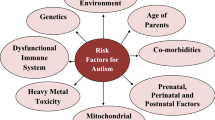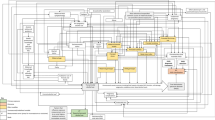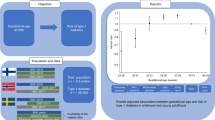Abstract
Emerging research suggests that adiponectin, a cytokine produced by adipose tissue, may be implicated in ASD. In this prospective birth cohort study (n = 847), we assessed the association between cord, early childhood plasma adiponectin and the risk of developing ASD. ASD was defined based on ICD codes of physician diagnosis. Cord adiponectin levels were inversely associated with ASD risk (aOR 0.50; 95% CI 0.33, 0.77), independent of preterm birth, early childhood adiponectin and other known ASD risk factors. Early childhood adiponectin, assessed prior to ASD diagnosis, was associated with lower risk of ASD, which attenuated after adjusting for cord adiponectin, indicating the relative importance of cord adiponectin in ASD risk. Further research is warranted to confirm our findings and elucidate biological mechanisms.


Similar content being viewed by others
References
Akintunde, M. E., Rose, M., Krakowiak, P., Heuer, L., Ashwood, P., Hansen, R., et al. (2015). Increased production of IL-17 in children with autism spectrum disorders and co-morbid asthma. Journal of Neuroimmunology, 286, 33–41. https://doi.org/10.1016/j.jneuroim.2015.07.003.
Al-Zaid, F. S., Alhader, A. A., & Al-Ayadhi, L. Y. (2014). Altered ghrelin levels in boys with autism: A novel finding associated with hormonal dysregulation. Scientific Reports, 4, 6478. https://doi.org/10.1038/srep06478.
Angelidou, A., Asadi, S., Alysandratos, K. D., Karagkouni, A., Kourembanas, S., & Theoharides, T. C. (2012). Perinatal stress, brain inflammation and risk of autism-review and proposal. BMC Pediatrics, 12, 89. https://doi.org/10.1186/1471-2431-12-89.
Ashwood, P., Krakowiak, P., Hertz-Picciotto, I., Hansen, R., Pessah, I., & Van de Water, J. (2011). Elevated plasma cytokines in autism spectrum disorders provide evidence of immune dysfunction and are associated with impaired behavioral outcome. Brain, Behavior, and Immunity, 25(1), 40–45. https://doi.org/10.1016/j.bbi.2010.08.003.
Ashwood, P., Kwong, C., Hansen, R., Hertz-Picciotto, I., Croen, L., Krakowiak, P., et al. (2008). Brief report: Plasma leptin levels are elevated in autism: Association with early onset phenotype? Journal of Autism and Developmental Disorders, 38(1), 169–175. https://doi.org/10.1007/s10803-006-0353-1.
Ashwood, P., Wills, S., & Van de Water, J. (2006). The immune response in autism: A new frontier for autism research. Journal of Leukocyte Biology, 80(1), 1–15. https://doi.org/10.1189/jlb.1205707.
American Psychiatric Association. (2013). Diagnostic and statistical manual of mental disorders (5th ed.). Washington, D.C.: American Psychiatric Association.
Baio, J., Wiggins, L., Christensen, D. L., Maenner, M. J., Daniels, J., Warren, Z., et al. (2018). Prevalence of autism spectrum disorder among children aged 8 years—Autism and developmental disabilities monitoring network, 11 sites, United States, 2014. MMWR Surveillance Summaries, 67(6), 1–23. https://doi.org/10.15585/mmwr.ss6706a1.
Baron, R. M., & Kenny, D. A. (1986). The moderator-mediator variable distinction in social psychological research: Conceptual, strategic, and statistical considerations. Journal of Personality and Social Psychology, 51(6), 1173–1182.
Blardi, P., de Lalla, A., Ceccatelli, L., Vanessa, G., Auteri, A., & Hayek, J. (2010). Variations of plasma leptin and adiponectin levels in autistic patients. Neuroscience Letters, 479(1), 54–57. https://doi.org/10.1016/j.neulet.2010.05.027.
Blardi, P., de Lalla, A., D’Ambrogio, T., Vonella, G., Ceccatelli, L., Auteri, A., et al. (2009). Long-term plasma levels of leptin and adiponectin in Rett syndrome. Clinical Endocrinology, 70(5), 706–709. https://doi.org/10.1111/j.1365-2265.2008.03386.x.
Brochu-Gaudreau, K., Rehfeldt, C., Blouin, R., Bordignon, V., Murphy, B. D., & Palin, M. F. (2010). Adiponectin action from head to toe. Endocrine, 37(1), 11–32. https://doi.org/10.1007/s12020-009-9278-8.
Brucato, M., Ladd-Acosta, C., Li, M., Caruso, D., Hong, X., Kaczaniuk, J., et al. (2017). Prenatal exposure to fever is associated with autism spectrum disorder in the boston birth cohort. Autism Research, 10(11), 1878–1890. https://doi.org/10.1002/aur.1841.
Burd, I., Balakrishnan, B., & Kannan, S. (2012). Models of fetal brain injury, intrauterine inflammation, and preterm birth. American Journal of Reproductive Immunology, 67(4), 287–294. https://doi.org/10.1111/j.1600-0897.2012.01110.x.
Chez, M. G., Dowling, T., Patel, P. B., Khanna, P., & Kominsky, M. (2007). Elevation of tumor necrosis factor-alpha in cerebrospinal fluid of autistic children. Pediatric Neurology, 36(6), 361–365. https://doi.org/10.1016/j.pediatrneurol.2007.01.012.
Darcy-Mahoney, A., Minter, B., Higgins, M., Guo, Y., Williams, B., Head Zauche, L. M., et al. (2016). Probability of an autism diagnosis by gestational age. Newborn and Infant Nursing Reviews, 16(4), 322–326. https://doi.org/10.1053/j.nainr.2016.09.019.
Dawczynski, K., de Vries, H., Beck, J. F., Schleussner, E., Wittig, S., & Proquitte, H. (2014). Adiponectin serum concentrations in newborn at delivery appear to be of fetal origin. Journal of Pediatric Endocrinology and Metabolism, 27(3–4), 273–278. https://doi.org/10.1515/jpem-2013-0218.
Erdei, C., & Dammann, O. (2014). The perfect storm: preterm birth, neurodevelopmental mechanisms, and autism causation. Perspectives in Biology and Medicine, 57(4), 470–481. https://doi.org/10.1353/pbm.2014.0036.
Essa, M. M., Braidy, N., Al-Sharbati, M. M., Al-Farsi, Y. M., Ali, A., Waly, M. I., et al. (2011). Elevated plasma leptin levels in autisic children of Sultanate of Oman. International Journal of Biological & Medical Research, 2(3), 803–805.
Fezer, G. F., Matos, M. B., Nau, A. L., Zeigelboim, B. S., Marques, J. M., & Liberalesso, P. B. N. (2017). Perinatal features of children with autism spectrum disorder. Revista Paulista de Pediatria, 35(2), 130–135. https://doi.org/10.1590/1984-0462/;2017;35;2;00003.
Fiorentino, M., Sapone, A., Senger, S., Camhi, S. S., Kadzielski, S. M., Buie, T. M., et al. (2016). Blood-brain barrier and intestinal epithelial barrier alterations in autism spectrum disorders. Molecular Autism, 7, 49. https://doi.org/10.1186/s13229-016-0110-z.
Fujita-Shimizu, A., Suzuki, K., Nakamura, K., Miyachi, T., Matsuzaki, H., Kajizuka, M., et al. (2010). Decreased serum levels of adiponectin in subjects with autism. Progress in Neuro-Psychopharmacology and Biological Psychiatry, 34(3), 455–458. https://doi.org/10.1016/j.pnpbp.2009.12.020.
Ghaffari, M. A., Mousavinejad, E., Riahi, F., Mousavinejad, M., & Afsharmanesh, M. R. (2016). Increased serum levels of tumor necrosis factor-alpha, resistin, and visfatin in the children with autism spectrum disorders: A case-control study. Neurology Research International. https://doi.org/10.1155/2016/9060751.
Hansen-Pupp, I., Hellgren, G., Hard, A. L., Smith, L., Hellstrom, A., & Lofqvist, C. (2015). Early surge in circulatory adiponectin is associated with improved growth at near term in very preterm infants. The Journal of Clinical Endocrinology and Metabolism, 100(6), 2380–2387. https://doi.org/10.1210/jc.2015-1081.
Hellgren, G., Engstrom, E., Smith, L. E., Lofqvist, C., & Hellstrom, A. (2015). Effect of preterm birth on postnatal apolipoprotein and adipocytokine profiles. Neonatology, 108(1), 16–22. https://doi.org/10.1159/000381278.
Hu, Y., Dong, X., & Chen, J. (2015). Adiponectin and depression: A meta-analysis. Biomedical Reports, 3(1), 38–42. https://doi.org/10.3892/br.2014.372.
Inami, I., Okada, T., Fujita, H., Makimoto, M., Hosono, S., Minato, M., et al. (2007). Impact of serum adiponectin concentration on birth size and early postnatal growth. Pediatric Research, 61(5 Pt 1), 604–606. https://doi.org/10.1203/pdr.0b013e3180459f8a.
Inoue, M., Maehata, E., Yano, M., Taniyama, M., & Suzuki, S. (2005). Correlation between the adiponectin-leptin ratio and parameters of insulin resistance in patients with type 2 diabetes. Metabolism, 54(3), 281–286. https://doi.org/10.1016/j.metabol.2004.09.006.
Ito, H., Morishita, R., & Nagata, K. I. (2017). Autism spectrum disorder-associated genes and the development of dentate granule cells. Medical Molecular Morphology, 50(3), 123–129. https://doi.org/10.1007/s00795-017-0161-z.
Kajantie, E., Hytinantti, T., Hovi, P., & Andersson, S. (2004). Cord plasma adiponectin: A 20-fold rise between 24 weeks gestation and term. The Journal of Clinical Endocrinology and Metabolism, 89(8), 4031–4036. https://doi.org/10.1210/jc.2004-0018.
Kotani, Y., Yokota, I., Kitamura, S., Matsuda, J., Naito, E., & Kuroda, Y. (2004). Plasma adiponectin levels in newborns are higher than those in adults and positively correlated with birth weight. Clinical Endocrinology, 61(4), 418–423. https://doi.org/10.1111/j.1365-2265.2004.02041.x.
Kuzniewicz, M. W., Wi, S., Qian, Y., Walsh, E. M., Armstrong, M. A., & Croen, L. A. (2014). Prevalence and neonatal factors associated with autism spectrum disorders in preterm infants. The Journal of Pediatrics, 164(1), 20–25. https://doi.org/10.1016/j.jpeds.2013.09.021.
Lehto, S. M., Huotari, A., Niskanen, L., Tolmunen, T., Koivumaa-Honkanen, H., Honkalampi, K., et al. (2010). Serum adiponectin and resistin levels in major depressive disorder. Acta Psychiatrica Scandinavica, 121(3), 209–215. https://doi.org/10.1111/j.1600-0447.2009.01463.x.
Lenz, A. M., & Diamond, F. (2012). The importance of the adiponectin and leptin relationship in in utero and infant growth. New York: Springer.
Li, M., Fallin, M. D., Riley, A., Landa, R., Walker, S. O., Silverstein, M., et al. (2016). The association of maternal obesity and diabetes with autism and other developmental disabilities. Pediatrics, 137(2), e20152206. https://doi.org/10.1542/peds.2015-2206.
Lindsay, R. S., Walker, J. D., Havel, P. J., Hamilton, B. A., Calder, A. A., Johnstone, F. D., et al. (2003). Adiponectin is present in cord blood but is unrelated to birth weight. Diabetes Care, 26(8), 2244–2249.
Lisik, M. Z., Gutmajster, E., & Sieron, A. L. (2016). Plasma levels of leptin and adiponectin in fragile X syndrome. Neuroimmunomodulation, 23(4), 239–243. https://doi.org/10.1159/000452336.
Lyall, K., Croen, L., Daniels, J., Fallin, M. D., Ladd-Acosta, C., Lee, B. K., et al. (2017). The changing epidemiology of autism spectrum disorders. Annual Review of Public Health, 38, 81–102. https://doi.org/10.1146/annurev-publhealth-031816-044318.
Machado-Vieira, R., Gold, P. W., Luckenbaugh, D. A., Ballard, E. D., Richards, E. M., Henter, I. D., et al. (2017). The role of adipokines in the rapid antidepressant effects of ketamine. Molecular Psychiatry, 22(1), 127–133. https://doi.org/10.1038/mp.2016.36.
Mansur, R. B., Rizzo, L. B., Santos, C. M., Asevedo, E., Cunha, G. R., Noto, M. N., et al. (2016). Adipokines, metabolic dysfunction and illness course in bipolar disorder. Journal of Psychiatric Research, 74, 63–69. https://doi.org/10.1016/j.jpsychires.2015.12.003.
Mantzoros, C. S., Rifas-Shiman, S. L., Williams, C. J., Fargnoli, J. L., Kelesidis, T., & Gillman, M. W. (2009). Cord blood leptin and adiponectin as predictors of adiposity in children at 3 years of age: A prospective cohort study. Pediatrics, 123(2), 682–689. https://doi.org/10.1542/peds.2008-0343.
Martos-Moreno, G. A., Barrios, V., Saenz de Pipaon, M., Pozo, J., Dorronsoro, I., Martinez-Biarge, M., et al. (2009). Influence of prematurity and growth restriction on the adipokine profile, IGF1, and ghrelin levels in cord blood: Relationship with glucose metabolism. European Journal of Endocrinology, 161(3), 381–389. https://doi.org/10.1530/EJE-09-0193.
Mazaki-Tovi, S., Kanety, H., Pariente, C., Hemi, R., Efraty, Y., Schiff, E., et al. (2007). Determining the source of fetal adiponectin. The Journal of Reproductive Medicine, 52(9), 774–778.
Mazaki-Tovi, S., Romero, R., Vaisbuch, E., Erez, O., Mittal, P., Chaiworapongsa, T., et al. (2009). Dysregulation of maternal serum adiponectin in preterm labor. Journal of Maternal-Fetal and Neonatal Medicine, 22(10), 887–904. https://doi.org/10.1080/14767050902994655.
Meyer, D. M., Brei, C., Stecher, L., Much, D., Brunner, S., & Hauner, H. (2017). Cord blood and child plasma adiponectin levels in relation to childhood obesity risk and fat distribution up to 5 y. Pediatric Research, 81(5), 745–751. https://doi.org/10.1038/pr.2016.275.
Molloy, C. A., Morrow, A. L., Meinzen-Derr, J., Schleifer, K., Dienger, K., Manning-Courtney, P., et al. (2006). Elevated cytokine levels in children with autism spectrum disorder. Journal of Neuroimmunology, 172(1–2), 198–205. https://doi.org/10.1016/j.jneuroim.2005.11.007.
Movsas, T. Z., & Paneth, N. (2012). The effect of gestational age on symptom severity in children with autism spectrum disorder. Journal of Autism and Developmental Disorders, 42(11), 2431–2439. https://doi.org/10.1007/s10803-012-1501-4.
Nakano, Y., Itabashi, K., Sakurai, M., Aizawa, M., Dobashi, K., & Mizuno, K. (2013). Preterm infants have altered adiponectin levels at term-equivalent age even if they do not present with extrauterine growth restriction. Hormone Research in Paediatrics, 80(3), 147–153. https://doi.org/10.1159/000354037.
Ng, R. C., & Chan, K. H. (2017). Potential neuroprotective effects of adiponectin in Alzheimer’s disease. International Journal of Molecular Sciences. https://doi.org/10.3390/ijms18030592.
Oberthuer, A., Donmez, F., Oberhauser, F., Hahn, M., Hoppenz, M., Hoehn, T., et al. (2012). Hypoadiponectinemia in extremely low gestational age newborns with severe hyperglycemia—A matched-paired analysis. PLoS ONE, 7(6), e38481. https://doi.org/10.1371/journal.pone.0038481.
Pardo, I. M., Geloneze, B., Tambascia, M. A., & Barros-Filho, A. A. (2004). Hyperadiponectinemia in newborns: Relationship with leptin levels and birth weight. Obesity Research, 12(3), 521–524. https://doi.org/10.1038/oby.2004.59.
Raghavan, R., Riley, A. W., Volk, H., Caruso, D., Hironaka, L., Sices, L., et al. (2018). Maternal multivitamin intake, plasma folate and vitamin B12 levels and autism spectrum disorder risk in offspring. Paediatric and Perinatal Epidemiology. https://doi.org/10.1111/ppe.12414.
Rodrigues, D. H., Rocha, N. P., Sousa, L. F., Barbosa, I. G., Kummer, A., & Teixeira, A. L. (2014). Changes in adipokine levels in autism spectrum disorders. Neuropsychobiology, 69(1), 6–10. https://doi.org/10.1159/000356234.
Saito, M., Nishimura, K., Nozue, H., Miyazono, Y., & Kamoda, T. (2011). Changes in serum adiponectin levels from birth to term-equivalent age are associated with postnatal weight gain in preterm infants. Neonatology, 100(1), 93–98. https://doi.org/10.1159/000322654.
Schendel, D., & Bhasin, T. K. (2008). Birth weight and gestational age characteristics of children with autism, including a comparison with other developmental disabilities. Pediatrics, 121(6), 1155–1164. https://doi.org/10.1542/peds.2007-1049.
Siahanidou, T., Mandyla, H., Papassotiriou, G. P., Papassotiriou, I., & Chrousos, G. (2007). Circulating levels of adiponectin in preterm infants. Archives of Disease in Childhood-Fetal and Neonatal Edition, 92(4), F286–F290. https://doi.org/10.1136/adc.2006.106112.
Song, J., Kang, S. M., Kim, E., Kim, C. H., Song, H. T., & Lee, J. E. (2015). Adiponectin receptor-mediated signaling ameliorates cerebral cell damage and regulates the neurogenesis of neural stem cells at high glucose concentrations: An in vivo and in vitro study. Cell Death & Differentiation, 6, e1844. https://doi.org/10.1038/cddis.2015.220.
Stefan, N., Bunt, J. C., Salbe, A. D., Funahashi, T., Matsuzawa, Y., & Tataranni, P. A. (2002). Plasma adiponectin concentrations in children: Relationships with obesity and insulinemia. The Journal of Clinical Endocrinology and Metabolism, 87(10), 4652–4656. https://doi.org/10.1210/jc.2002-020694.
Terrazzan, A. C., Procianoy, R. S., & Silveira, R. C. (2014). Neonatal cord blood adiponectin and insulin levels in very low birth weight preterm and healthy full-term infants. Journal of Maternal-Fetal and Neonatal Medicine, 27(6), 616–620. https://doi.org/10.3109/14767058.2013.823939.
Thundyil, J., Pavlovski, D., Sobey, C. G., & Arumugam, T. V. (2012). Adiponectin receptor signalling in the brain. British Journal of Pharmacology, 165(2), 313–327. https://doi.org/10.1111/j.1476-5381.2011.01560.x.
Tsai, P. J., Yu, C. H., Hsu, S. P., Lee, Y. H., Chiou, C. H., Hsu, Y. W., et al. (2004). Cord plasma concentrations of adiponectin and leptin in healthy term neonates: Positive correlation with birthweight and neonatal adiposity. Clinical Endocrinology, 61(1), 88–93. https://doi.org/10.1111/j.1365-2265.2004.02057.x.
Villarreal-Molina, M. T., & Antuna-Puente, B. (2012). Adiponectin: Anti-inflammatory and cardioprotective effects. Biochimie, 94(10), 2143–2149. https://doi.org/10.1016/j.biochi.2012.06.030.
Wang, G., Divall, S., Radovick, S., Paige, D., Ning, Y., Chen, Z., et al. (2014). Preterm birth and random plasma insulin levels at birth and in early childhood. JAMA, 311(6), 587–596. https://doi.org/10.1001/jama.2014.1.
Wang, G., Hu, F. B., Mistry, K. B., Zhang, C., Ren, F., Huo, Y., et al. (2016a). Association between maternal prepregnancy body mass index and plasma folate concentrations with child metabolic health. JAMA Pediatrics, 170(8), e160845. https://doi.org/10.1001/jamapediatrics.2016.0845.
Wang, G., Johnson, S., Gong, Y., Polk, S., Divall, S., Radovick, S., et al. (2016b). Weight gain in infancy and overweight or obesity in childhood across the gestational spectrum: A prospective birth cohort study. Scientific Reports, 6, 29867. https://doi.org/10.1038/srep29867.
Wang, X., Zuckerman, B., Pearson, C., Kaufman, G., Chen, C., Wang, G., et al. (2002). Maternal cigarette smoking, metabolic gene polymorphism, and infant birth weight. JAMA, 287(2), 195–202.
Wei, H., Alberts, I., & Li, X. (2013). Brain IL-6 and autism. Neuroscience, 252, 320–325. https://doi.org/10.1016/j.neuroscience.2013.08.025.
Weyermann, M., Beermann, C., Brenner, H., & Rothenbacher, D. (2006). Adiponectin and leptin in maternal serum, cord blood, and breast milk. Clinical Chemistry, 52(11), 2095–2102. https://doi.org/10.1373/clinchem.2006.071019.
Wozniak, R. H., Leezenbaum, N. B., Northrup, J. B., West, K. L., & Iverson, J. M. (2017). The development of autism spectrum disorders: Variability and causal complexity. Wiley Interdisciplinary Reviews: Cognitive Science, 8(1–2), e1426. https://doi.org/10.1002/wcs.1426.
Yeung, E. H., McLain, A. C., Anderson, N., Lawrence, D., Boghossian, N. S., Druschel, C., et al. (2015). Newborn adipokines and birth outcomes. Paediatric and Perinatal Epidemiology, 29(4), 317–325. https://doi.org/10.1111/ppe.12203.
Yoshida, T., Nagasaki, H., Asato, Y., & Ohta, T. (2009). The ratio of high-molecular weight adiponectin and total adiponectin differs in preterm and term infants. Pediatric Research, 65(5), 580–583. https://doi.org/10.1203/PDR.0b013e3181995103.
Young, A. M., Campbell, E., Lynch, S., Suckling, J., & Powis, S. J. (2011). Aberrant NF-kappaB expression in autism spectrum condition: A mechanism for neuroinflammation. Frontiers in Psychiatry, 2, 27. https://doi.org/10.3389/fpsyt.2011.00027.
Zerbo, O., Yoshida, C., Grether, J. K., Van de Water, J., Ashwood, P., Delorenze, G. N., et al. (2014). Neonatal cytokines and chemokines and risk of Autism Spectrum Disorder: The Early Markers for Autism (EMA) study: A case-control study. Journal of Neuroinflammation, 11, 113. https://doi.org/10.1186/1742-2094-11-113.
Zhang, D., Wang, X., Wang, B., Garza, J. C., Fang, X., Wang, J., et al. (2017). Adiponectin regulates contextual fear extinction and intrinsic excitability of dentate gyrus granule neurons through AdipoR2 receptors. Molecular Psychiatry, 22(7), 1044–1055. https://doi.org/10.1038/mp.2016.58.
Zhang, D., Wang, X., & Lu, X. Y. (2016a). Adiponectin exerts neurotrophic effects on dendritic arborization, spinogenesis, and neurogenesis of the dentate gyrus of male mice. Endocrinology, 157(7), 2853–2869. https://doi.org/10.1210/en.2015-2078.
Zhang, Z. Q., Lu, Q. G., Huang, J., Jiao, C. Y., Huang, S. M., & Mao, L. M. (2016b). Maternal and cord blood adiponectin levels in relation to post-natal body size in infants in the first year of life: A prospective study. BMC Pregnancy and Childbirth, 16(1), 189. https://doi.org/10.1186/s12884-016-0978-9.
Funding
This study is supported in part by the Health Resources and Services Administration (HRSA) of the U.S. Department of Health and Human Services (HHS) under grant number R40MC27443, Autism Field-initiated Innovative Research Studies Program; and grant number UJ2MC31074, Autism Single Investigator Innovation Program. This information or content and conclusions are those of the author and should not be construed as the official position or policy of, nor should any endorsements be inferred by HRSA, HHS or the U.S. Government. The Boston Birth Cohort (the parent study) was supported in part by the March of Dimes PERI grants (20-FY02-56, #21-FY07-605); and the National Institutes of Health (NIH) grants (R21ES011666, R01HD041702, R21HD066471, U01AI090727, R21AI079872, and R01HD086013). Ramkripa Raghavan is supported by John and Alice Chenoweth-Pate Fellowship in her current training.
Author information
Authors and Affiliations
Contributions
XW is the principal investigator of the Boston Birth Cohort, initiated the Boston Birth Cohort, oversaw subject recruitment, follow-up, and data collection, conceptualized the study and provided critical inputs on the study design, data analyses, interpretation of data, initial draft and revision of the manuscript. RR conceptualized and designed the study, assumed primary responsibility for data cleaning and statistical analyses, and drafted and revised this manuscript. MDR, YJ, EAS, and DP provided critical inputs on the study design, data analyses, interpretation of data and revision of the manuscript. XH and GW coordinated subject recruitment and follow-up, collected data, and critically reviewed the manuscript.
Corresponding author
Ethics declarations
Conflict of interest
None of the authors have a conflict of interest pertaining to this work.
Ethical Approval
All procedures performed in studies involving human participants were in accordance with the ethical standards of the institutional and/or national research committee and with the 1964 Helsinki declaration and its later amendments or comparable ethical standards.
Informed Consent
Informed consent was obtained from all individual participants included in the study.
Electronic supplementary material
Below is the link to the electronic supplementary material.
Rights and permissions
About this article
Cite this article
Raghavan, R., Fallin, M.D., Hong, X. et al. Cord and Early Childhood Plasma Adiponectin Levels and Autism Risk: A Prospective Birth Cohort Study. J Autism Dev Disord 49, 173–184 (2019). https://doi.org/10.1007/s10803-018-3688-5
Published:
Issue Date:
DOI: https://doi.org/10.1007/s10803-018-3688-5




